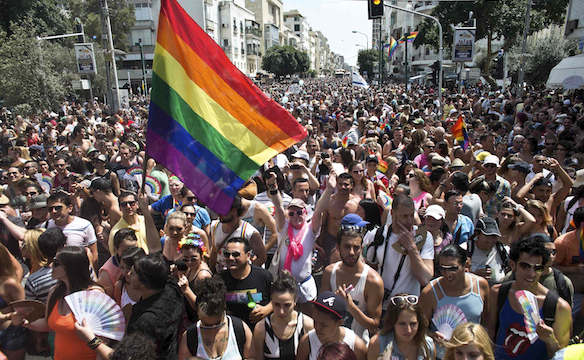Contributed by Lindsay Hurwitz, our CAMERA Fellow at the University of Michigan. This piece was republished in the Algemeiner.
In honor of the recent Jewish holiday of Passover, I found myself reminiscing about the oppression of the Jewish people in Egypt thousands of years ago. I then considered a more modern representation of the oppression of a people based off of a belief, situation, or attribute that a person was born into. I considered the situation of the LGBTQ community in Israel and came up with the following question:
Why is this state different from all other states (in the Middle East)?

In all other states, being LGBTQ is comparable to a crime; but in this state, it is not only accepted, but also celebrated.
In 1988, same-sex sexual activity was legalized in Israel, making Israel the first country in Asia to recognize same-sex unions. Although no same-sex marriages are performed in Israel itself, it is currently the only country in Asia to recognize same-sex marriages performed elsewhere. In 1992, discriminating based off of a person’s sexual orientation was prohibited, followed by a 2008 law allowing same-sex couples to adopt children together. All Israeli citizens, regardless of their sexual orientation, serve in the Israeli Defense Forces, and openly LGBTQ soldiers can hold classified positions in the IDF. Openly LGBTQ community members also hold parliamentary positions and have become famous artists and entertainers within the state.
In fact, Tel Aviv, Israel has been deemed one of the top friendliest cities to the LGBTQ community worldwide. This week, Tel Aviv will host a huge Gay Pride Parade complete with music, speeches, and floats. Thousands of people from all over the world join together at this parade to celebrate the freedom to be openly LGBTQ in Israel. This is not to ignore the fact that there are communities within Israel that oppose the LGBTQ community. Nonetheless, other countries look to Israel with admiration, as its general acceptance of LGBTQ should serve as a model to its neighbors.
Meanwhile, in Syria, being LGBTQ is outright illegal. In fact, both “coming out” and the creation of LGBTQ rights movements can lead to imprisonment. Syria rules according to Islamist law, which just so happens to be an incredibly oppressive governing system. Regardless of consent, desire, and age, Syrian laws dictate that homosexuality is a crime.
In Egypt, however, being LGBTQ is technically not illegal. However, the most dominant religion in Egypt, Islam, rejects the possibility of being LGBTQ and deems same-sex relationships to be illegitimate. Therefore, LGBTQ people are often arrested and charged with pornography or prostitution and face several years in jail simply for expressing or celebrating their sexual orientation. Thus, due to a fear of being arrested, many people keep their sexual orientations hidden and present a façade of heterosexuality.
Actually, in Gaza, homosexuality is illegal. Hamas opposes being LGBTQ, and such Palestinians have been tortured and killed simply for embracing their homosexuality. Also, within the Palestinian territories, there are no laws protecting the LGBTQ community members from harassment based off of their sexual orientation. In the Palestinian authorities, same-sex relationships of any sort are not recognized as legitimate. In fact, due to a lack of protection, hundreds of gay Palestinians have fled to Israel for safety.
According to the article “Professor Addresses Stigma Faced by Gay Palestinians” posted on the Michigan Daily website, Professor Sa’ed Ashtan spoke about his experience coming out as a gay Palestinian. As the statements in this article show, Professor Ashtan references the torment that Palestinians face in the West Bank every day. However, this sentiment is not related to being LGBTQ in the Palestinian territories or in Israel. This insinuates that the Palestinian Authority’s persecution of Palestinian LGBTQ community members and the hardships that this community endures in Israel is the fault of the Israeli government. However, these Palestinians are not under Israeli rule and Israel is the most welcoming state in the Middle East to the LGBTQ community. What should instead be noted are the numerous benefits that living in Israel grants members of the LGBTQ community as opposed to living in its neighboring countries or in the Palestinian territories.
It is important to stand in solidarity with members of the Palestinian LGBTQ community, as no person should ever have to face persecution simply based off of his or her sexual orientation. In order to successfully support the LGBTQ community in its entirety, the oppressors of these communities should be scrutinized. States like Israel that, for the most part, welcome and celebrate the LGBTQ community should not be punished for their acceptance of LGBTQ.
